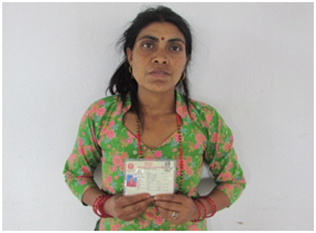Maiya's struggle for citizenship card
19 Jul 2017
The Interim Constitution of Nepal guarantees the right to identity as a fundamental right. Legal identity documents confirm a state’s acknowledgment of a person’s existence. In Nepal, the citizenship certificate is considered as the most important formal legal document, as it is often a prerequisite for obtaining other identity documents. But it is not easy for rural women to get citizenship in Nepal. Maiya Sunar represents rural women of Nepal who face such problems. She struggled to get her Citizenship card.
33 years old, Maiya lives in Kavre district. Maiya is the youngest child of a family who lived below the poverty line. Her mother died when she was two years old. She was in primary level when she had to leave her school because her family could not afford her school education and requirements. Then she started to work as a domestic worker in the village.
At the age of 17, her father forced her to marry 24 years old man next to the village. Her marital life was not easy because her husband was an alcoholic. He is a driver who returned drunk after work. She advised her husband not to drink too much but in return, she suffered from physical and mental violence. Days passed on; she gave a birth to a daughter. Neither she nor her child received proper care during the maternity period. Her suffering increased because she was not able to give a son to the family. Her husband threatened to do a second marriage if she would not give her son.
 After the devastating earthquake that struck the country in 2015, Maiya lost her home and her family had to live in a temporary shelter. Her family received cloth, foods, tents, corrugated galvanized iron (CGI) sheets, and NRs. 15,000 as relief materials to be protected from the monsoon. Even for the relief support proof of citizenship was required which Maiya lacked. So, her husband went to receive the support. Unfortunately, the amount that her husband received was spent on alcohol.
After the devastating earthquake that struck the country in 2015, Maiya lost her home and her family had to live in a temporary shelter. Her family received cloth, foods, tents, corrugated galvanized iron (CGI) sheets, and NRs. 15,000 as relief materials to be protected from the monsoon. Even for the relief support proof of citizenship was required which Maiya lacked. So, her husband went to receive the support. Unfortunately, the amount that her husband received was spent on alcohol.
She did not have money to get protected in the monsoon in her temporary shelter.
“I feel very bad during that time, I was deprived of getting relief amount only because I did not have citizenship card. My husband wasted that money buying bottles of alcohol. Later, I attended orientations organized by organizations."
One day she heard that a program on Women’s Right and Violence against women organized by WOREC Nepal in her village.
"My neighbor asked me to join that orientation, I went there with my two years old daughter. During the program, rights of women were discussed and issues of citizenship were also raised. At the end of the program, some women shared regarding the issues of land and how they got legal advice from resource person."
She wanted to speak regarding her own issue of citizenship, "I wanted to share my problem but I felt shy."
On the mid of June, Village Development Committee Office was distributing allowances for the child under age four. She went to take an allowance for her two years old daughter. But same as before, she needs to show her citizenship card in order to receive it. She stood quietly nearby the VDC Office and asked a woman where she should go to get a citizenship card and what are the processes. That woman introduced her to the staff of WOREC. She shared her problem about her house, husband and supports that she was not able to receive. Staff of WOREC went to her home and met her husband. She tried to convince her husband to get citizenship for his wife but her husband was so furious and said, "I won't allow her to get citizenship card until she gives a birth to a son”. Staff of WOREC still tried to convince him that getting a citizenship is her fundamental right and daughter and son are same. After a long discussion WOREC staff was able to convince him to get a citizenship for Maiya. From the day her husband got the information about women's and got aware of the legal provision for domestic violence. Domestic violence started decreasing although he still drinks.
Despite all these problems, Maiya got a citizenship card and she is active and encouraged to take leadership and participate in disaster recovery and decision making, roles in government's rehabilitation and reconstruction plan.
She is happy with her daughter and is participating regularly in the training, meeting, and discussion organized by community and organizations.

 After the devastating earthquake that struck the country in 2015, Maiya lost her home and her family had to live in a temporary shelter. Her family received cloth, foods, tents, corrugated galvanized iron (CGI) sheets, and NRs. 15,000 as relief materials to
After the devastating earthquake that struck the country in 2015, Maiya lost her home and her family had to live in a temporary shelter. Her family received cloth, foods, tents, corrugated galvanized iron (CGI) sheets, and NRs. 15,000 as relief materials to